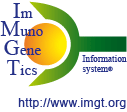The IGL C-REGIONs encoded by 4-5 IGLC genes in the 7-IGLC gene haplotype,
belong to four serological isotypic forms. These lambda isotypes differ by limited amino acid substitutions which produce the Oz
[1-3], Kern (Ke) [4,5] and Mcg [6,7] serological markers
[8,9]:
- Mcg+ proteins have Asn 1 and Thr 3 (positions according to the
IMGT unique numbering for C-DOMAIN)
whereas Mcg- proteins have Ala 1 and Ser 3.
Position 82 initially described as characteristic of the Mcg marker is not involved [9]. Indeed, the protein MOR is different from the other Mcg- proteins by having Ala 82 [10], and the protein MCP which is Mcg- Oz- and is encoded by the IGLC7 gene [11], has Lys 82. - Ke+ proteins have Gly 45 whereas Ke- proteins have Ser 45.
- Oz+ proteins have Lys 100 whereas Oz- proteins have Arg 100.
Correspondence between serological lambda isotypes and IGLC gene and allele names [9]
| Serological Isotypes |
IGLC gene and allele name | Amino acid positions (1) | ||||
|---|---|---|---|---|---|---|
| 1 | 3 | 45 | 82 | 100 | ||
| (6) | (8) | (46) | (57) | (83) | ||
| 112 | 114 | 152 | 163 | 190 | ||
| Mcg+ Ke+ Oz- | IGLC1*01, *02 | Asn AAC |
Thr ACG |
Gly GGC |
Lys AAA |
Arg AGA |
| Mcg- Ke- Oz- | IGLC2*01, *02, *03 IGLC3*04 IGLC2D1*01 |
Ala GCC |
Ser TCG |
Ser AGC |
Thr ACA |
Arg AGA |
| Mcg- Ke- Oz+ | IGLC3*01, *02, *03 | Ala GCC |
Ser TCG |
Ser AGC |
Thr ACA |
Lys AAA |
| Mcg- Ke+ Oz- | IGLC2*04 IGLC6*01 |
Ala GCC |
Ser TCG |
Gly GGC |
Thr ACA |
Arg AGA |
| IGLC7*01, *02, *03 | Ala GCC |
Ser TCG |
Gly GGC |
Lys AAA |
Arg AGA |
|
| (1) | Amino acid positions according to the
IMGT unique numbering for C-DOMAIN (in bold),
to the IMGT exon numbering (between parentheses)
and to the Kabat numbering (in italics).
Whereas the serological markers Mcg, Ke and Oz were initially assigned to Bence-Jones and myeloma proteins using specific antibodies
[12]. The antiserum which allowed to recognize Ke+ is no longer available. The assignment of the Mcg- Ke+ Oz- isotype to IGLC gene and allele names is based on the presence or absence of characteristic amino acids [9]. |
| [1] | Apella, E. and Ein, D., Proc. Natl. Acad. Sci. USA, 57, 1449-1454 (1967). |
| [2] | Ein, D. and Fahey, J.L., Science, 156, 957-950 (1967). |
| [3] | Ein, D., Proc. Natl. Acad. Sci. USA, 60, 982-985 (1968). |
| [4] | Ponstingl, H. et al., Hoppe-Seyler's Z. Physiol. Chem., 349, 867-871 (1968). |
| [5] | Hess, M. et al., Nature New Biol., 234, 58-61 (1971). |
| [6] | Fett, J.W. and Deutsh, H.F., Biochemistry, 13, 4102-4114 (1974). |
| [7] | Fett, J.W. and Deutsh, H.F., Immunochemistry, 12, 643-652 (1975). |
| [8] | Dariavach, P. et al., Proc. Natl. Acad. Sci. USA., 84, 9074-9078 (1987). |
| [9] | Lefranc, M.P. and Lefranc, G., Immunoglobulin lambda (IGL) genes of human and mouse. In: Molecular Biology of B cells (eds. Alt F., Honjo T. and Neuberger M.S.), Elsevier, London, UK (2003 in press). |
| [10] | Frangione, B. et al., Proc. Natl. Acad. Sci. USA, 82, 3415-3419 (1985). |
| [11] | Niewold, T.A. et al., J. Immunol., 157, 4474-4477 (1996). |
| [12] | Walter, M.R. et al., J. Immunol., 140, 1600-1604 (1988). |
See also:
- Germline gene table: Human IGLC (IMGT Repertoire)
- IMGT gene name nomenclature for IG and TR of human and other vertebrates (IMGT Scientific chart)



